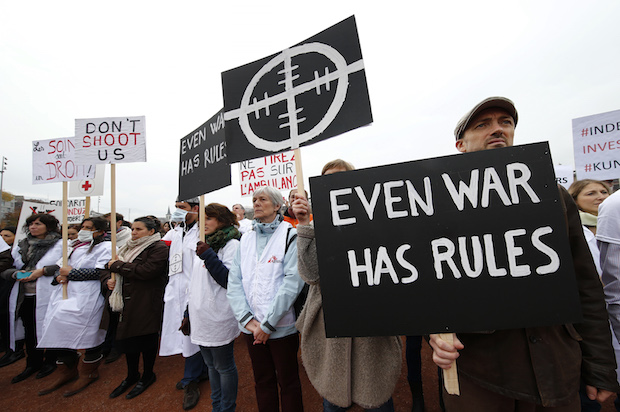“We are facing an epidemic of attacks on health facilities, impeding our ability to do our core work,” declared the international president of humanitarian medical organization Doctors Without Borders, in a powerful, heartwrenching address before the United Nations Security Council in New York City on Tuesday.
“In Afghanistan, the Central African Republic, South Sudan, Sudan, Syria, Ukraine and Yemen, hospitals are routinely bombed, raided, looted or burned to the ground,” she continued.
“Medical personnel are threatened. Patients are shot in their beds. Broad attacks on communities and precise attacks on health facilities are described as mistakes, are denied outright, or are simply met with silence.”
“In reality, they amount to massive, indiscriminate and disproportionate civilian targeting in urban settings, and, in the worst cases, they are acts of terror.”
Joanne Liu, international president of Doctors Without Borders, known internationally in French as Médecins Sans Frontières, or MSF, blasted the bombing campaigns carried out by the NATO-led coalition in Afghanistan, the Saudi-led coalition in Yemen and the Russian-backed, Syrian-led coalition.
“The effects of the attacks against health facilities emanate far beyond those immediately killed and injured,” she said.
“They demolish routine and lifesaving healthcare for all. They make life impossible. Full stop.”
Syria
Liu condemned the airstrikes on an MSF-backed hospital in a rebel-controlled part of Aleppo, Syria on April 27 that killed at least 50 people, including the last physician remaining in the area.
Control of Aleppo is split between rebels and the Syrian government. Among the rebel groups are extremists, including al-Qaeda affiliate al-Nusra.
On Tuesday, rebels attacked another hospital as part of shelling that killed at least 19 Syrians in government-controlled areas of the city, according to a pro-rebel group. The Syrian government accused al-Nusra and allied Islamist groups of being behind the attacks.
Secretary of State John Kerry was asked on Monday how the U.S. and its allies are “going to separate al-Nusra from the opposition fighters and stop the fighting in Aleppo.” Kerry answered ambiguously, saying “this is what we’re discussing” and “we have some work to do, and that’s why we’re here.”
Sec. Kerry was meeting in Geneva with Adel al-Jubeir, the foreign minister of Saudi Arabia, which has supported al-Nusra.
MSF President Liu excoriated the hospital bombing.
“What are individuals in wars today? Expendable commodities, dead or alive,” she said.
“Patients and doctors are legitimate targets. Women, children, the sick, the wounded and their caregivers, are condemned to death.”
“Stop these attacks,” Liu declared.
Afghanistan
In October, the U.S.-led NATO coalition bombed an MSF-run hospital in Kunduz, Afghanistan, killing 42 civilians. Fourteen MSF staff were killed in the attack.
“One of the survivors, an MSF nurse whose left arm was blown off during the relentless airstrike, told me something that haunts me daily,” Liu recalled in the U.N. briefing. “He said that when fighting erupted in Kunduz, MSF told its staff that its trauma center was a safe place.”
‘”We believed you,’ he said. ‘Did you know that we would be bombed?’ I told him that until October 3, I truly believed that the hospital was a safe place.”
“I cannot say that anymore about any medical facilities on the frontlines today,” she added.
The Pentagon released its report on the bombing last week. It maintained that the bombing was a mistake and therefore was not a war crime.
Patricia Grossman of Human Rights Watch shot back, “It is established principle of customary international law that war crimes can be committed through recklessness.”
Sixteen U.S. officers received administrative discipline for the attack, but none will face criminal charges.
The U.S. refused to allow an independent investigation into the Kunduz bombing. MSF and human rights groups such as Amnesty International continue to call for an independent inquiry.
In the Security Council briefing, Liu condemned the impunity for all governments behind attacks on hospitals.
“To date, our calls for independent investigations have gone unheeded,” she said.
“Accountability begins with independent and impartial fact finding. Perpetrators cannot be investigators, judges and juries,” Liu insisted.
“Medical ethics cannot be buried by war.”
“The neutrality of war-time medical care cannot be stamped out by state sovereignty or domestic law,” she added.
“While the nature of warfare may have changed, the rules of war have not.”
Yemen
Over a period of three months, the U.S.-backed Saudi-led coalition also bombed three MSF-supported medical facilities in Yemen.
Liu blasted these bombings. “Attacks on MSF facilities provide only a glimpse into the brutality of war,” she said.
“Attacks on other hospitals and clinics — and schools, markets, houses of worship — are routine. Local health workers bear the brunt of these abuses,” Liu added.
“We are at a deadly impasse. We can no longer assume that fully functioning hospitals — in which patients are fighting for their lives — are out of bounds. Hospitals and patients have been dragged onto the battlefield.”
Liu scolded the U.N. Security Council, accusing it of hypocrisy. “You are charged with protecting peace and security,” she said. “Yet four of the five permanent members of this council have, to varying degrees, been associated with coalitions responsible for attacks on health structures over the last year.”
“I repeat: Stop these attacks.”
The MSF president pressured the U.N. to act against the impunity and to prevent medical facilities and workers from continuing to be attacked.
“Make no mistake: we will relentlessly denounce attacks on healthcare. We will speak out loudly and with force about what we witness in the field,” Liu said.
“Medicine must not be a deadly occupation. Patients must not be attacked or slaughtered in their beds.”
“We will not leave patients behind. And we will not be silent,” she continued. “Seeking or providing healthcare must not be a death sentence.”

